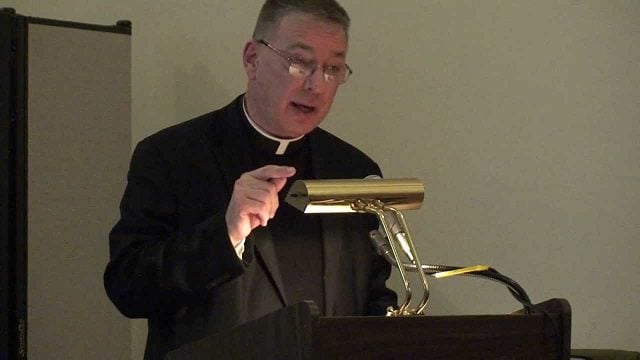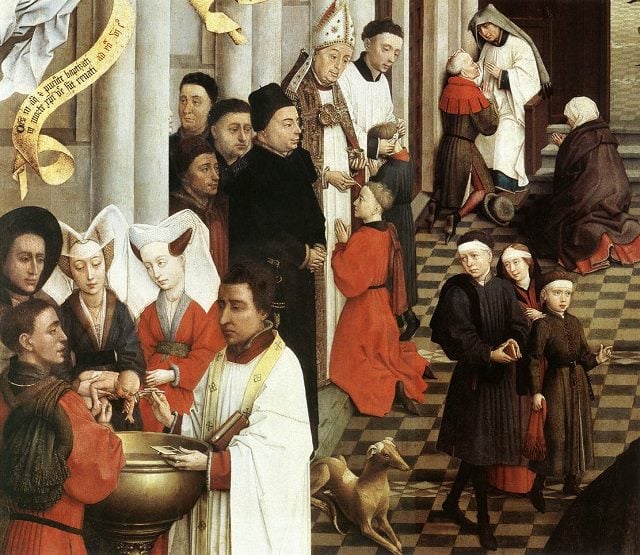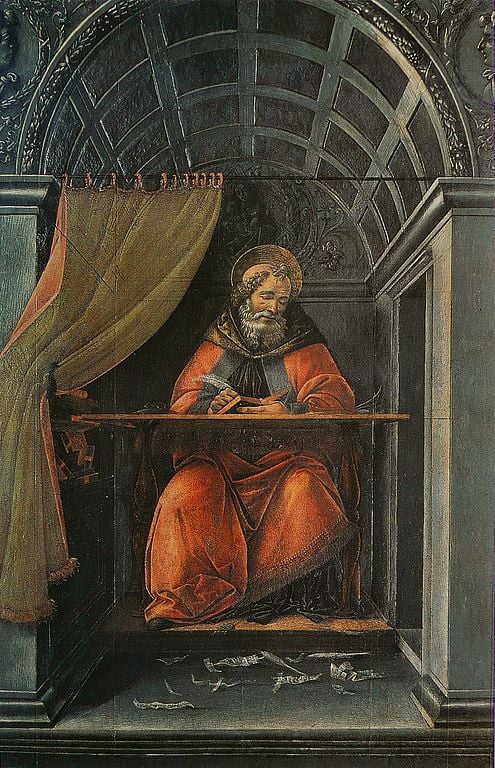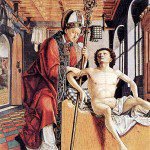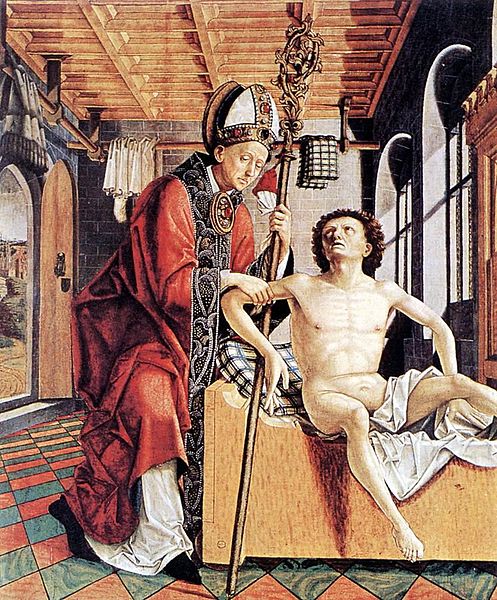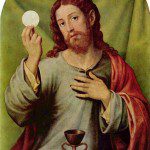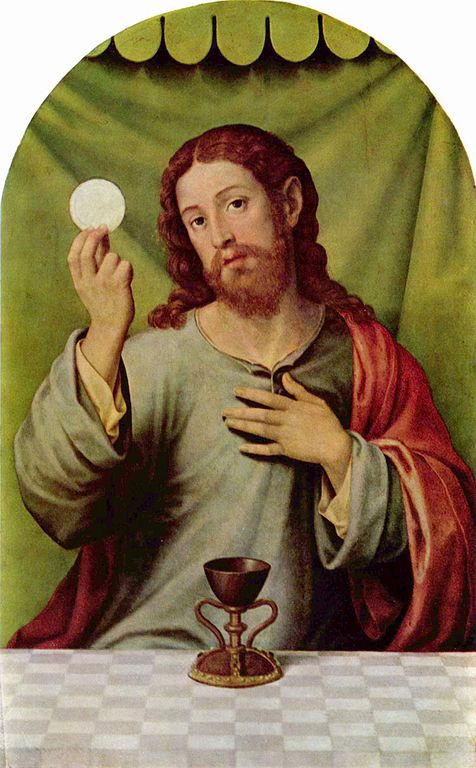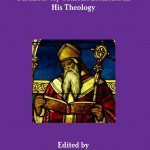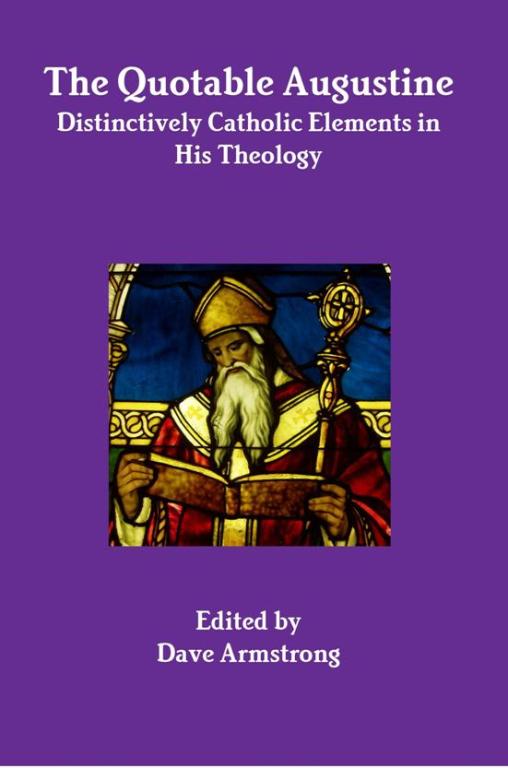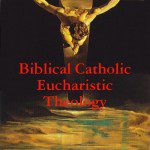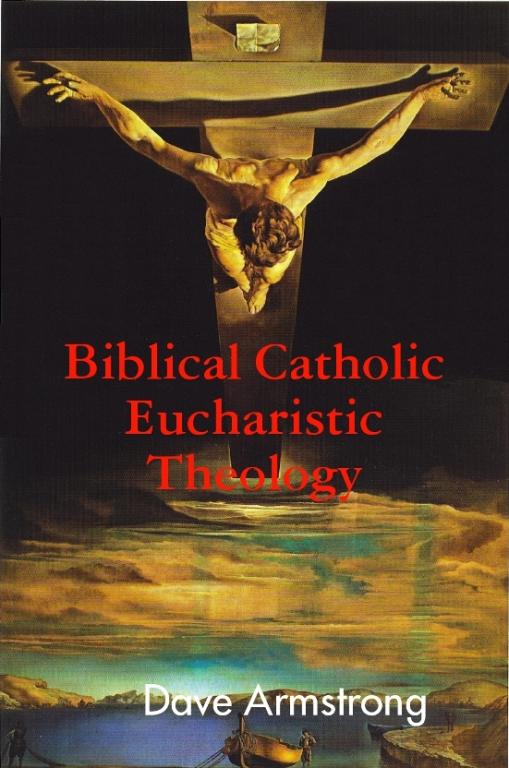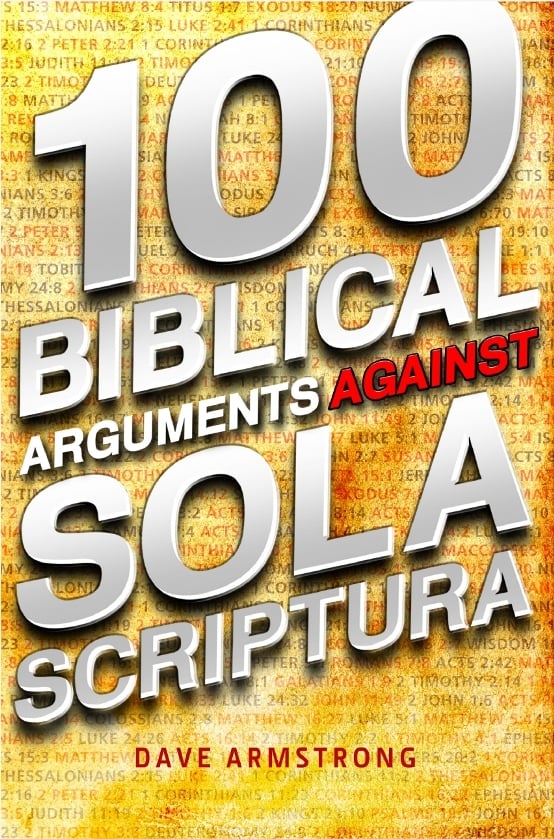
Portrait of St. Augustine (c. 1480) by Sandro Botticelli (1445-1510) [public domain / Wikimedia Commons]
(9-25-10)
***
It’s amazing how often this assertion is made: that the great Church father St. Augustine (354-430) was closer to Protestant beliefs than Catholic, or that (a less sweeping claim) he was at least closer to Protestants on some key divisive issues such as sola Scriptura and sola fide. I’ve written about various aspects of this hallowed Protestant myth many times.
Presently, I will simply list below his own words, categorized by doctrine, regarding 29 different beliefs. I’ve chosen some of the more striking excerpts from my latest book: Catholic Church Fathers. The only portions not from my book are the ones on the deuterocanonical books and contraception. You be the judge.
As a preamble of sorts (and in the end, a bit of ironic humor), I shall present the high estimation of St. Augustine from Reformed Baptist James White, who somehow (inexplicably) convinces himself that Augustine is more in his camp, than in the Catholic one — that he (equally remarkably) deems non-Christian (my emphases):
The old truth that Calvin preached, that Augustine preached, that Paul preached . . . Augustine and Calvin, who in successive ages were the great exponents of the system of grace . . . (“Dave Hunt vs. Charles Haddon Spurgeon”)
It does not seem that any discussion of ancient theology can be pursued without invoking the great name of Augustine. But surely by now Roman controversialists should be aware that Augustine is no friend of their cause. (“Whitewashing the History of the Church”)
Certain men throughout the history of the Christian church capture the imagination. Paul, Augustine, Wycliffe, Hus, Luther, Calvin, Zwingli – . . . . (“The Sovereign God, the Grace of Christ, and Sinful Man: A Brief Inquiry into the Theology of Jonathan Edwards”)
[for an entire book of Augustine quotes, see my own volume; available for as low as $1.99!]
* * * * *
Apostolic Succession?
[I]f you acknowledge the supreme authority of Scripture, you should recognise that authority which from the time of Christ Himself, through the ministry of His apostles, and through a regular succession of bishops in the seats of the apostles, has been preserved to our own day throughout the whole world, with a reputation known to all. (Reply to Faustus the Manichaean, 33:9; NPNF 1, Vol. IV, 345)
And if any one seek for divine authority in this matter, though what is held by the whole Church, and that not as instituted by Councils, but as a matter of invariable custom, is rightly held to have been handed down by apostolical authority, still we can form a true conjecture of the value of the sacrament of baptism in the case of infants. (On Baptism, 4, 24, 31; NPNF 1, Vol. IV, 61)
Baptism (Regenerative and Salvific)?
The Christians of Carthage have an excellent name for the sacraments, when they say that baptism is nothing else than “salvation” and the sacrament of the body of Christ nothing else than “life.” Whence, however, was this derived, but from that primitive, as I suppose, and apostolic tradition, by which the Churches of Christ maintain it to be an inherent principle, that without baptism and partaking of the supper of the Lord it is impossible for any man to attain either to the kingdom of God or to salvation and everlasting life? (On Forgiveness of Sins and Baptism, 1:34; NPNF 1, V, 28)
When you shall have been baptized, keep to a good life in the commandments of God so that you may preserve your baptism to the very end. . . . Baptism was instituted for all sins. . . . In the Church, therefore, there are three ways in which sins are forgiven: in baptisms, in prayer, and in the greater humility of penance; yet, God does not forgive sins except to the baptized. (Sermon to Catechumens on the Creed 7:15, 8:16; Jurgens, III, 35)
“Catholic” Church
For in the Catholic Church, not to speak of the purest wisdom, to the knowledge of which a few spiritual men attain in this life, so as to know it, in the scantiest measure, deed, because they are but men, . . . – not to speak of this wisdom, which you do not believe to be in the Catholic Church, there are many other things which most justly keep me in her bosom. The consent of peoples and nations keeps me in the Church; so does her authority, inaugurated by miracles, nourished by hope, enlarged by love, established by age. The succession of priests keeps me, beginning from the very seat of the Apostle Peter, to whom the Lord, after His resurrection, gave it in charge to feed His sheep, down to the present episcopate. And so, lastly, does the name itself of Catholic, which, not without reason, amid so many heresies, the Church has thus retained; so that, though all heretics wish to be called Catholics, yet when a stranger asks where the Catholic Church meets, no heretic will venture to point to his own chapel or house. (Against the Epistle of Manichaeus 4:5; NPNF 1, Vol. IV, 130)
For my part, I should not believe the gospel except moved by the authority of the Catholic Church. (Against the Epistle of Manichaeus 5, 6; NPNF 1, Vol. IV, 131)
Church (Authority)?
God has placed this authority first of all in his Church. (Explanations of the Psalms, Tract 103:8, PL 37:520-521; in Congar, 392)
It is obvious; the faith allows it; the Catholic Church approves; it is true. (Sermon 117, 6)
Church (Scripture Interpreter)?
To be sure, although on this matter, we cannot quote a clear example taken from the canonical Scriptures, at any rate, on this question, we are following the true thought of Scriptures when we observe what has appeared good to the universal Church which the authority of these same Scriptures recommends to you; thus, since Holy Scripture cannot be mistaken, anyone fearing to be misled by the obscurity of this question has only to consult on this same subject this very Church which the Holy Scriptures point out without ambiguity. (Against Cresconius I:33; in Eno, 134)
Contraception?
The doctrine that the production of children is an evil, directly opposes the next precept, “Thou shall not commit adultery;” for those who believe this doctrine, in order that their wives may not conceive, are led to commit adultery even in marriage. They take wives, as the law declares, for the procreation of children; but from this erroneous fear of polluting the substance of the deity, their intercourse with their wives is not of a lawful character; and the production of children, which is the proper end of marriage, they seek to avoid. As the apostle long ago predicted of thee, thou dost indeed forbid to marry, for thou seekest to destroy the purpose of marriage. Thy doctrine turns marriage into an adulterous connection, and the bed-chamber into a brothel. (Against Faustus, Book XV, 7; NPNF 1, Vol. IV)
Deuterocanonical Books / So-Called “Apocrypha”?
Now the whole canon of Scripture on which we say this judgment is to be exercised, is contained in the following books:—Five books of Moses, that is, Genesis, Exodus, Leviticus, Numbers, Deuteronomy; one book of Joshua the son of Nun; one of Judges; one short book called Ruth, which seems rather to belong to the beginning of Kings; next, four books of Kings, and two of Chronicles—these last not following one another, but running parallel, so to speak, and going over the same ground. The books now mentioned are history, which contains a connected narrative of the times, and follows the order of the events. There are other books which seem to follow no regular order, and are connected neither with the order of the preceding books nor with one another, such as Job, and Tobias, and Esther, and Judith, and the two books of Maccabees, and the two of Ezra, which last look more like a sequel to the continuous regular history which terminates with the books of Kings and Chronicles. Next are the Prophets, in which there is one book of the Psalms of David; and three books of Solomon, viz., Proverbs, Song of Songs, and Ecclesiastes. For two books, one called Wisdom and the other Ecclesiasticus, are ascribed to Solomon from a certain resemblance of style, but the most likely opinion is that they were written by Jesus the son of Sirach. Still they are to be reckoned among the prophetical books, since they have attained recognition as being authoritative. The remainder are the books which are strictly called the Prophets: twelve separate books of the prophets which are connected with one another, and having never been disjoined, are reckoned as one book; the names of these prophets are as follows:—Hosea, Joel, Amos, Obadiah, Jonah, Micah, Nahum, Habakkuk, Zephaniah, Haggai, Zechariah, Malachi; then there are the four greater prophets, Isaiah, Jeremiah, Daniel, Ezekiel. The authority of the Old Testament is contained within the limits of these forty-four books. That of the New Testament, again, is contained within the following:—Four books of the Gospel, according to Matthew, according to Mark, according to Luke, according to John; fourteen epistles of the Apostle Paul—one to the Romans, two to the Corinthians, one to the Galatians, to the Ephesians, to the Philippians, two to the Thessalonians, one to the Colossians, two to Timothy, one to Titus, to Philemon, to the Hebrews: two of Peter; three of John; one of Jude; and one of James; one book of the Acts of the Apostles; and one of the Revelation of John. (On Christian Doctrine, Book II, Chapter 8, section 13: “The Canonical Books”; NPNF 1, Vol. II; bolding added presently)
Eternal Security / Perseverence?
But if someone already regenerate and justified should, of his own will, relapse into his evil life, certainly that man cannot say: “I have not received’; because he lost the grace he received from God and by his own free choice went to evil. (Admonition and Grace [c. 427], 6,9; Jurgens, III, 157)
Man, therefore, was thus made upright that, though unable to remain in his uprightness without divine help, he could of his own mere will depart from it. (Enchiridion of Faith, Hope, and Love, chapter 107; NPNF 1, Vol. III)
When you shall have been baptized, keep to a good life in the commandments of God so that you may preserve your baptism to the very end. . . . (Sermon to Catechumens on the Creed 7:15, 8:16; Jurgens, III, 35)
Eucharist (Adoration)?
For He took upon Him earth from earth; because flesh is from earth, and He received flesh from the flesh of Mary. And because He walked here in very flesh, and gave that very flesh to us to eat for our salvation; and no one eateth that flesh, unless he hath first worshipped: we have found out in what sense such a footstool of our Lord’s may be worshipped, and not only that we sin not in worshipping it, but that we sin in not worshipping. (Exposition on Psalm XCIX, 8; NPNF 1, Vol. VIII)
Eucharist (Real, Substantial, Physical Presence)?
“And was carried in His Own Hands:” how “carried in His Own Hands”? Because when He commended His Own Body and Blood, He took into His Hands that which the faithful know; and in a manner carried Himself, when He said, “This is My Body.” (Exposition on Psalm XXXIV, 1; NPNF 1, Vol. VIII)
What you see is the bread and the chalice . . . But what your faith obliges you to accept is that the bread is the Body of Christ and the chalice the Blood of Christ. (Sermons, 272; Jurgens, III, 32)
For not all bread, but only that which receives the blessing of Christ, becomes Christ’s body. (Sermons, 234, 2; Jurgens, III, 31)
Eucharist (Salvific)?
Whence, however, was this derived, but from that primitive, as I suppose, and apostolic tradition, by which the Churches of Christ maintain it to be an inherent principle, that without baptism and partaking of the supper of the Lord it is impossible for any man to attain either to the kingdom of God or to salvation and everlasting life? (On Forgiveness of Sins and Baptism, 1:34; NPNF 1, V, 28)
Faith Alone (Sola Fide)?
This must not be understood in such a way as to say that a man who has received faith and continues to live is righteous, even though he leads a wicked life. (Questions 76.1; commenting on Romans 3:28; Bray, 105; Defferari, Vol. 70, 195)
Unintelligent persons, however, with regard to the apostle’s statement: “We conclude that a man is justified by faith without the works of the law,” have thought him to mean that faith suffices to a man, even if he lead a bad life, and has no good works. (A Treatise on Grace and Free Will; Chapters 18; NPNF 1, Vol. V)
[E]ven those good works of ours, which are recompensed with eternal life, belong to the grace of God, . . . the apostle himself, after saying, “By grace are ye saved through faith; and that not of yourselves, it is the gift of God: not of works, lest any man should boast;” saw, of course, the possibility that men would think from this statement that good works are not necessary to those who believe, but that faith alone suffices for them . . . “Not of works” is spoken of the works which you suppose have their origin in yourself alone; but you have to think of works for which God has moulded (that is, has formed and created) you. . . . grace is for grace, as if remuneration for righteousness; in order that it may be true, because it is true, that God “shall reward every man according to his works.” (A Treatise on Grace and Free Will; Chapter 20; NPNF 1, Vol. V)
Irresistible Grace?
He who made you without your consent does not justify you without your consent. He made you without your knowledge, but He does not justify you without your willing it. (Sermons, 169, 3; Jurgens, III, 29)
[N]either is the law condemned by the apostle nor is free will taken away from man. (On Romans 13-18; commenting on Romans 3:20; Bray, 96; Landes, 5, 7)
Mary (Perpetual Virginity)?
Virgin in conceiving, virgin in giving birth, virgin with child, virgin mother, virgin forever. (Sermo 186, 1 [Christmas homily]; Gambero, 220)
Did not holy Virgin Mary both give birth as a virgin and remain a virgin? (Sermo Guelferbytanus, 1, 8; Miscellanea Agostiniana, 447-448; Gambero, 224)
Thus Christ by being born of a virgin, who, before she knew Who was to be born of her, had determined to continue a virgin, chose rather to approve, than to command, holy virginity. (Of Holy Virginity, section 4; NPNF 1, Vol. III, 418)
Mary (Sinlessness)?
We must except the holy Virgin Mary, concerning whom I wish to raise no question when it touches the subject of sins, out of honour to the Lord; for from Him we know what abundance of grace for overcoming sin in every particular was conferred upon her who had the merit to conceive and bear Him who undoubtedly had no sin. Well, then, if, with this exception of the Virgin, we could only assemble together all the forementioned holy men and women, and ask them whether they lived without sin whilst they were in this life, what can we suppose would be their answer? (A Treatise on Nature and Grace, chapter 42 [XXXVI]; NPNF 1, Vol. V)
Mass, Sacrifice of?
Thus He is both the Priest who offers and the Sacrifice offered. And He designed that there should be a daily sign of this in the sacrifice of the Church, which, being His body, learns to offer herself through Him. Of this true Sacrifice the ancient sacrifices of the saints were the various and numerous signs; . . . To this supreme and true sacrifice all false sacrifices have given place. (City of God, Book X, 20; NPNF 1, Vol. II)
Not only is no one forbidden to take as food the Blood of this Sacrifice, rather, all who wish to possess life are exhorted to drink thereof. (Questions of the Hepateuch, 3, 57; Jurgens, III, 134)
The entire Church observes the tradition delivered to us by the Fathers, namely, that for those who have died in the fellowship of the Body and Blood of Christ, prayer should be offered when they are commemorated at the actual Sacrifice in its proper place, and that we should call to mind that for them, too, that Sacrifice is offered. (Sermo, 172, 2; 173, 1; De Cura pro mortuis, 6; De Anima et ejus Origine, 2, 21; Pope, 69)
Was not Christ once for all offered up in His own person as a sacrifice? and yet, is He not likewise offered up in the sacrament as a sacrifice, not only in the special solemnities of Easter, but also daily among our congregations; so that the man who, being questioned, answers that He is offered as a sacrifice in that ordinance, declares what is strictly true? (Epistles, 98, 9; NPNF 1, Vol. I)
The Hebrews, again, in their animal sacrifices, which they offered to God in many varied forms, suitably to the significance of the institution, typified the sacrifice offered by Christ. This sacrifice is also commemorated by Christians, in the sacred offering and participation of the body and blood of Christ. (Against Faustus, XX, 18; NPNF 1, Vol. IV)
Merit: Opposed to Sola Gratia?
The Lord made Himself a debtor not by receiving something, but by promising something. One does not say to Him “Pay for what You received,” but, “Pay what You promised.” (Commentary on Psalms 83:16; Jurgens, III, 19)
You are glorified in the assembly of your Holy Ones, for in crowning their merits you are crowning your own gifts. (En. in Ps. 102:7; cf. Ep. 194, 5, 19)
Someone says to me: “Since we are acted upon, it is not we who act.” I answer, “No, you both act and are acted upon; and if you are acted upon by the good, you act properly. For the spirit of God who moves you, by so moving, is your Helper. The very term helper makes it clear that you yourself are doing something.” (Sermons 156, 11; Jurgens, III, 28)
Wherefore, even eternal life itself, which is surely the reward of good works, the apostle calls the gift of God . . . We are to understand, then, that man’s good deserts are themselves the gift of God, so that when these obtain the recompense of eternal life, it is simply grace given for grace. (Enchiridion of Faith, Hope, and Love, chapter 107; NPNF 1, Vol. III)
Mortal and Venial Sins?
When you shall have been baptized, keep to a good life in the commandments of God so that you may preserve your baptism to the very end. I do not tell you that you will live here without sin, but they are venial sins which this life is never without. Baptism was instituted for all sins. For light sins, without which we cannot live, prayer was instituted. . . . But do not commit those sins on account of which you would have to be separated from the body of Christ. Perish the thought! . . . If their sins were light, daily prayer would suffice to blot them out.
In the Church, therefore, there are three ways in which sins are forgiven: in baptisms, in prayer, and in the greater humility of penance; yet, God does not forgive sins except to the baptized. (Sermon to Catechumens on the Creed 7:15, 8:16; Jurgens, III, 35)
The Papacy and Roman (“Apostolic”) See (Primacy of)?
Argue with them when they speak against grace, and if they persist, bring them to us. You see, there have already been two councils about this matter, and their decisions sent to the Apostolic See; from there rescripts have been sent back here. The case is finished; if only the error were finished too, sometime! So, let us all warn them to take notice of this, teach them to learn the lesson of it, pray for them to change their ideas. (Sermon 131, 10, in John Rotelle, editor, The Works of St. Augustine – Sermons, 11 volumes, Part 3, New Rochelle: New City Press, 1993, Vol. 4:322; the saying, “Rome has spoken; the case is closed” is a paraphrase of part of this sermon. Jurgens, [III, 28] translates it as “two Councils have already been sent to the Apostolic See; and from there rescripts too have come. The matter is at an end; would that the error too might sometime be at an end.”)
This was thought to have been the case in him when he replied that he consented to the letters of Pope Innocent of blessed memory, in which all doubt about this matter was removed . . . [T]he words of the venerable Bishop Innocent concerning this matter to the Carthaginian Council … What could be more clear or more manifest than that judgment of the Apostolical See? (Against Two Letters of the Pelagians, 3:5; NPNF 1, Vol. V, 393-394)
[T]he Catholic Church, by the mercy of God, has repudiated the poison of the Pelagian heresy. There is an account of the provincial Council of Carthage, written to Pope Innocent, and one of the Council of Numidia; and another, somewhat more detailed, written by five bishops, as well as the answer he [Pope Innocent] wrote to these three; likewise, the report to Pope Zosimus of the Council of Africa, and his answer which was sent to all the bishops of the world. (Letter to Valentine, Epistle 215; Deferrari, 32: 63-64)
. . . the Roman Church, in which the supremacy of an apostolic chair has always flourished. (To Glorius et al, Epistle 43, 7; NPNF 1, Vol. I, 278)
Penance?
After they have been released from your severe sentence we separate from association at the altar those whose crimes are public, so that by repenting and by punishing themselves they may be able to placate Him for whom, by their sinning, they showed their contempt. (Letter to Macedonius, Imperial Vicar of Africa, 153, 3, 6; Jurgens, III, 7)
For those whom you see doing penance have committed crimes, either adultery or some other enormities. That is why they are doing penance. If their sins were light, daily prayer would suffice to blot them out. In the Church, therefore, there are three ways in which sins are forgiven: in baptisms, in prayer, and in the greater humility of penance . . . (Sermon to Catechumens on the Creed 7:15, 8:16; Jurgens, III, 35)
[T]his is why, either to demonstrate the misery he deserves, or for the amendment of his disgraceful life, or for the exercise of needful patience, a man is detained temporally in punishment even when by his guilt he is no longer held liable to eternal damnation. (Homilies on John, 124, 5; Jurgens, III, 123)
Peter (Primacy and Preeminence)?
The Lord, indeed, had told His disciples to carry a sword; but He did not tell them to use it. But that after this sin Peter should become a pastor of the Church was no more improper than that Moses, after smiting the Egyptian, should become the leader of the congregation. (Reply to Faustus the Manichean, 22:70; NPNF 1, Vol. IV, 299)
Among these [apostles] it was only Peter who almost everywhere was given privilege of representing the whole Church. It was in the person of the whole Church, which he alone represented, that he was privileged to hear, ‘To you will I give the keys of the kingdom of heaven’ (Mt 16:19)… Quite rightly too did the Lord after his resurrection entrust his sheep to Peter to be fed. It’s not, you see, that he alone among the disciples was fit to feed the Lord’s sheep; but when Christ speaks to one man, unity is being commended to us. And he first speaks to Peter, because Peter is first among the apostles. (Sermon 295:2-4, in John Rotelle, editor, The Works of St. Augustine – Sermons, 11 volumes, Part 3, New Rochelle: New City Press, 1993, 197-199)
. . . the Apostle Peter, in whom the primacy of the apostles shines with such exceeding grace . . . who can be ignorant that the primacy of his apostleship is to be preferred to any episcopate whatever?” (On Baptism 2:1,1; NPNF 1, Vol. IV, 425-426)
Prayers for the Dead?
It is not to be doubted that the dead are aided by prayers of the holy church, and by the salutary sacrifice, and by the alms, which are offered for their spirits . . . For this, which has been handed down by the Fathers, the universal church observes. (Sermon 172, in Joseph Berington and John Kirk, The Faith of Catholics, three volumes, London: Dolman, 1846; I: 439)
Prayer, however, is offered for other dead who are remembered. (Sermons: 159, 1; Jurgens, III, 29)
For some of the dead, indeed, the prayer of the Church or of pious individuals is heard; but it is for those who, having been regenerated in Christ, did not spend their life so wickedly that they can be judged unworthy of such compassion, nor so well that they can be considered to have no need of it. (The City of God, XXI, 24, 2; NPNF 1, Vol. II)
Purgatory?
The man who perhaps has not cultivated the land and has allowed it to be overrun with brambles has in this life the curse of his land on all his works, and after this life he will have either purgatorial fire or eternal punishment. (Genesis Defended Against the Manicheans, 2, 20, 30)As also, after the resurrection, there will be some of the dead to whom, after they have endured the pains proper to the spirits of the dead, mercy shall be accorded, and acquittal from the punishment of the eternal fire. For were there not some whose sins, though not remitted in this life, shall be remitted in that which is to come, it could not be truly said, “They shall not be forgiven, neither in this world, neither in that which is to come.” (The City of God, XXI, 24, 2; NPNF 1, Vol. II)
Relics?
But, nevertheless, we do not build temples, and ordain priests, rites, and sacrifices for these same martyrs; for they are not our gods, but their God is our God. Certainly we honor their reliquaries, as the memorials of holy men of God who strove for the truth even to the death of their bodies, that the true religion might be made known, and false and fictitious religions exposed. (City of God, Book VIII, chapter 27; NPNF 1, Vol. II)
When the bishop Projectus was bringing the relics of the most glorious martyr Stephen to the waters of Tibilis, a great concourse of people came to meet him at the shrine. There a blind woman entreated that she might be led to the bishop who was carrying the relics. He gave her the flowers he was carrying. She took them, applied them to her eyes, and forthwith saw. (City of God, Book XXII, chapter 8; NPNF 1, Vol. II)
Saints (Invocation / Intercession of)?
For it is wrong to pray for a martyr, to whose prayers we ought ourselves be commended. (Sermons: 159, 1; Jurgens, III, 29)
Saints (Veneration of)?
No one officiating at the altar in the saints’ burying-place ever says, We bring an offering to thee, O Peter! or O Paul! or O Cyprian! The offering is made to God, who gave the crown of martyrdom, while it is in memory of those thus crowned. The emotion is increased by the associations of the place, and love is excited both towards those who are our examples, and towards Him by whose help we may follow such examples. We regard the martyrs with the same affectionate intimacy that we feel towards holy men of God in this life, when we know that their hearts are prepared to endure the same suffering for the truth of the gospel. There is more devotion in our feeling towards the martyrs, because we know that their conflict is over; and we can speak with greater confidence in praise of those already victors in heaven, than of those still combating here. What is properly divine worship, which the Greeks call latria, and for which there is no word in Latin, both in doctrine and in practice, we give only to God. To this worship belongs the offering of sacrifices; as we see in the word idolatry, which means the giving of this worship to idols. Accordingly we never offer, or require any one to offer, sacrifice to a martyr, or to a holy soul, or to any angel. (Against Faustus, Book XX, section 21; NPNF 1, Vol. IV)
Scripture Alone (Sola Scriptura)?
And thus a man who is resting upon faith, hope, and love, and who keeps a firm hold upon these, does not need the Scriptures except for the purpose of instructing others. Accordingly, many live without copies of the Scriptures, even in solitude, on the strength of these three graces. (On Christian Doctrine, I, 39:43; NPNF 1, Vol. II, 534)
Tradition (Infallible and Authoritative)?
I believe that this practice [of not rebaptizing heretics and schismatics] comes from apostolic tradition, just as so many other practices not found in their writings nor in the councils of their successors, but which, because they are kept by the whole Church everywhere, are believed to have been commanded and handed down by the Apostles themselves. (On Baptism, 2, 7, 12; Jurgens, III, 66; cf. NPNF 1, IV, 430)
Tradition (Oral)?
. . . the custom, which is opposed to Cyprian, may be supposed to have had its origin in apostolic tradition, just as there are many things which are observed by the whole Church, and therefore are fairly held to have been enjoined by the apostles, which yet are not mentioned in their writings. (On Baptism, 5, 23:31; NPNF 1, IV, 475)
Bibliographical Sources
Bray, Gerald, editor [Thomas C. Oden, general editor of series), Ancient Christian Commentary on Scripture: New Testament VI: Romans, Downers Grove, Illinois: InterVarsity Press, 1998.
Congar, Yves, Tradition and Traditions: An Historical and Theological Essay, New York: Macmillan, 1967.
Deferrari, R.J., editor, Fathers of the Church: A New Translation, 86 volumes, Washington, D.C.: Catholic University of America Press, 1947 –.
Eno, Robert B., Teaching Authority in the Early Church, Wilmington: Michael Glazier, 1984.
Gambero, Luigi, Mary and the Fathers of the Church: The Blessed Virgin Mary in Patristic Thought, Thomas Buffer, translator, San Francisco: Ignatius Press, revised edition of 1999.
Jurgens, William A., editor and translator, The Faith of the Early Fathers, three volumes, Collegeville, Minnesota: Liturgical Press, 1970 and 1979 (2nd and 3rd volumes).
Landes, P.F. editor, Augustine on Romans, Chico: California: Scholars Press, 1982.
Pope, Hugh, St. Augustine of Hippo, Garden City, New York: Doubleday Image, 1961 (originally 1937).
Schaff, Philip, editor, Early Church Fathers: Nicene & Post-Nicene Fathers Series 1 (“NPNF 1”), 14 volumes, originally published in Edinburgh, 1889, available online.
***
***




